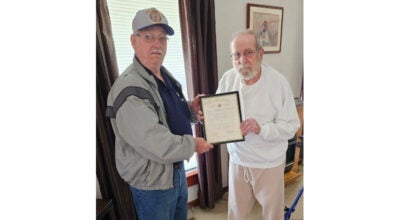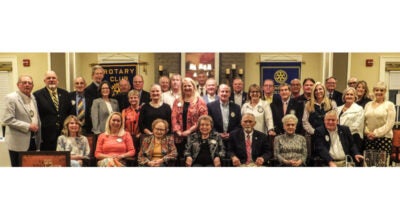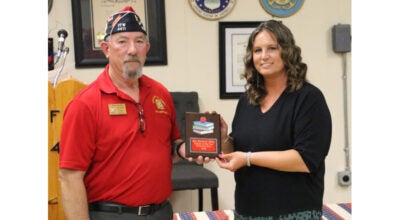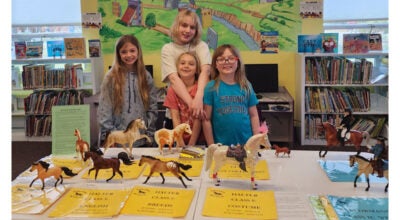Water flows downhill (and other statements of the obvious)
Published 2:02 pm Saturday, October 22, 2016
by Andrew Book
One of my jobs as a pastor is to “order the life of the church.”
“Order” is a fancy word for setting up the systems, teams, programs, committees, small groups and all the other pieces that allow the church to truly help people to follow Jesus. When I first went into ministry, I thought that “order” was the least important part of my role as a pastor, falling far behind the “important” things such as prayer, worship, Bible study, counseling, mentoring and many other duties. However, the longer I have been in ministry, the more I have realized that the systems and structures we have in place in the church are probably the most important ways we can help people to follow Jesus.
In the church, you can see the structures that are in place by asking questions like, “What does it mean to get involved?” Is getting involved coming to a meeting to discuss fund raising or maintenance? Is getting involved going to a Bible Study? Is getting involved being a part of a service or missions opportunity? I have to ask myself and my church what we are inviting people to be a part of. Some of those groups will help you hear the voice of God and follow God. Some will not. Naturally, the kind of faith that develops will reflect the priorities people see as they get involved. If “involved” means taking care of the building or finances, then a life of faith will be a life focused on a building — and that is not the call of Jesus.
As a United Methodist pastor, I often look to the history of the Methodist church to find wisdom. Methodists discovered the importance of making the right “systems” early on. George Whitefield was a more powerful preacher that Methodist founder John Wesley, but he did not do anything to order the church to help those who came to follow Christ through his preaching.
Whitefield made this statement on his deathbed: “My brother (John) Wesley acted wisely. The souls that were awakened under his ministry he joined to societies, and thus preserved the fruit of his labor. This I neglected, and my people are a rope of sand.”
Societies were small groups devoted to helping people better follow Jesus. It was the societies, combined with preaching the word of God, which transformed England and America in the 1700s and gave birth to the Methodist movement which has touched millions of lives.
Unfortunately, churches struggle to keep our focus on helping people to follow Jesus when there is so much “church business” to attend to. We easily fall into the trap of focusing on things like finance, buildings and personnel (All committees that a United Methodist church is required to have!), instead of funneling people into groups, which ask them where they are seeing God, how they are hearing God and encouraging them to follow God.
Water flows downhill: people come to see “church” as being about the building and the finances because that is where we have directed them! Our challenge in the church is to ensure we are not creating a “rope of sand” that will blow away with the first stiff wind. We need structures to help people put Jesus first!
By this point, you may be asking, “What does this have to do with me?” This has to do with you because the same dynamics are at work in your life. Each of us must create structures, schedules, and systems in our own lives if we want to grow or change. If you want to become healthier, simply saying, “I want to exercise and eat better” will not work. You need to make a plan, make a schedule and have accountability.
Step 1. Make a Plan: Making a plan means you sit down and figure out the details of what you are going to do. our plan should involve the actions you will do (For example, run a mile, shop for healthy food, cook homemade meals), when you will do them (Running Monday, Wednesday and Friday from 6:30 to 7 a.m.; shopping Saturdays from 10 to 11 a.m.; cooking each night from 5:30 to 6 p.m.), and who will hold you accountable (running buddies who will meet you each morning; people who will eat with you; or someone you will schedule a call with each week to ask, “How are you doing?”).
Step 2. Make a Schedule: I use a Google Calendar that connects to my computer and phone. It alerts me as scheduled events approach so I don’t forget. The type of calendar you use doesn’t matter, but you do need a way to make sure the time you have for you plan is truly set aside so you will not plan things which conflict.
Step 3. Have Accountability: Accountability can take many forms, from someone you ask to check on you each week to someone who is acting out your plan with you (if they are waiting you are more likely to go!), to a coach or trainer who helps make the plan and ensures you are following through. It is possible to follow through on a plan without accountability, but it is much harder. Don’t make things harder than they need to be!
Once you have done all of your steps, you will have the structures in place to achieve your goals: reading Scripture or praying more, getting healthy, quitting smoking, or whatever you need to do in this part of your life.
Water flows downhill, so make sure the hill will point the water where you want it to go. If you want to join a group of people working to make sure our hill points people to deeper relationship with Jesus, come join us at Courtland United Methodist Church. We all need people in our lives to help us reach our goal, so connect with those who you need!
ANDREW BOOK is the pastor of Courtland United Methodist Church. He can be contacted at 653-2240 or andrew@courtlandumcva.org.
Courtland United Methodist Church
The Christian Wallet: Jesus talked more about money than any single subject, and what he said has the power to shape our lives and finances today. Join us beginning this Sunday at 11 a.m. as we try to discover how to use or finances to live for God.
• Oct. 23: Choosing Simplicity in a Consumer World
• Oct. 30: Cultivating Generosity in a “Me-First” World
• Nov. 6: Shopping with Values in a World of “Deals”
• Nov. 13: Tithing as Thankfulness and Worship in an “I’ve Earned It” World.
Pumpkin Painting: Join us after worship on Oct. 23 as we share lunch and paint pumpkins together!Contact the church office if you are coming so we will have enough pumpkins to go around!





